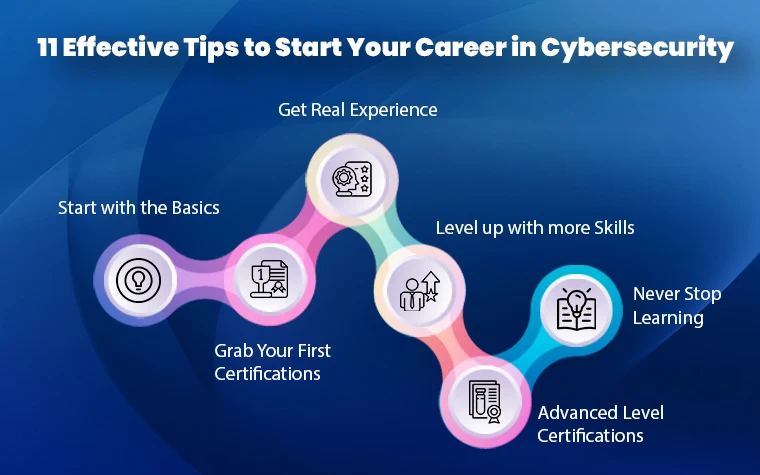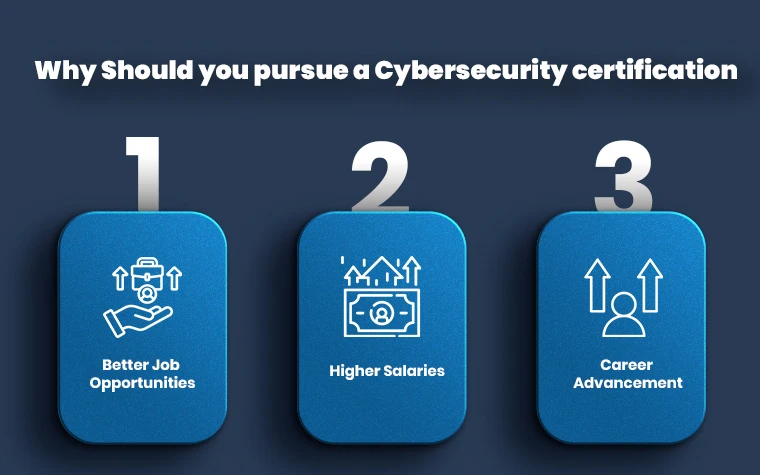
11 Effective Tips to Start Your Career in Cybersecurity
With this helpful step-by-step guide, you can learn how to become a highly sought-after cybersecurity specialist regardless of your level of experience.
The development and targeting of cyber threats are growing. Businesses must therefore make significant investments in strong cybersecurity to safeguard their staff, defend their digital assets, and maintain their brand.
These tactics are the result of the expertise of cyber security specialists, who are in high demand in a wide range of sectors. Considering the widening skills gap in cybersecurity, this is an excellent opportunity to launch your career with a cybersecurity certification course. You’ll learn the knowledge, credentials, and experience required to launch your career in cybersecurity in this blog.
Let’s take a look at this Roadmap so that you can follow in the footsteps to excel in your Cybersecurity Career.
Here are our best suggestions to get you started on the road to success:
1. Develop a Solid Foundation of Knowledge
It’s crucial to grasp the basics before starting your cybersecurity adventure. Look for opportunities to learn about computer systems, networks, and security fundamentals—all of which are important to cyber security. You’ll have the skills and self-assurance to advance your education and profession with this solid foundation. It helps you to reach your destination in no time.
2. Take Charge of your Learning
You can take control of your development through a variety of self-directed learning alternatives. Utilise digital tools, textbooks, and online courses to fully immerse yourself in cybersecurity. Check out the variety of cybersecurity courses offered by KGiSl Micro College, which are aimed at giving you the necessary skills to succeed in the workplace. Once you get the cybersecurity certification, you can witness a surge in your career.
3. Gain Industry-Recognized Certificates
Having industry-recognized certificates helps prospective employers see your expertise and abilities. Seek out credentials that are respected in the field of cybersecurity, such as the Certified Information Security Manager (CISM) and the Certified Ethical Hacker (CEH). etc. and make a mark in this digital world.
4. Practical Skills Enhancement
While theoretical knowledge is important, real-world experience helps you get ready for the workplace. Look for volunteer work, internships, or cybersecurity certification online that provide hands-on learning to help you develop the employable skills you need to succeed in the field. KGiSL Micro College offers online Cybersecurity courses along with added benefits. You can develop the needed skills by enrolling with us.
5. Stay up-to-date with Industry Trends
Use blogs, podcasts, and cybersecurity news sources to stay current on various industry developments and maintain your competitive edge. You always need to be sharp and keep abreast of the latest happenings to survive.
6. Organize your Professional Connections
Expand your professional network to gain access to job openings and mentorships. You need to attend local security gatherings and cybersecurity conferences and participate actively in online forums and communities. This is also one of the vital steps in building your career in cybersecurity.
7. Find your Cybersecurity Specialization
Gaining expertise in a certain field might help you stand out from the competition. Choose a particular aspect of cybersecurity that showcases your interest, such as network security, penetration testing, incident response, or cloud protection.
8. Design a Home Learning Environment
Take part in live cybersecurity challenges to put your skills to the test and hone your reaction times. Try out cutting-edge threat detection technologies to stay abreast of the most recent developments in security. Establishing a disciplined learning schedule will enable you to confidently grasp intricate security procedures.
9. Focus on Personal Projects
You can showcase your commitment and abilities to prospective employers by working on personal projects. By participating in bug bounty programs, creating security applications, or donating to open-source security technologies, you can construct a portfolio. There are many cybersecurity certifications for beginners. If you can get any, it will provide a good impression to the employers, undoubtedly.
A few Prominent cybersecurity certifications along with skills for beginners are:
| Related Skill | Certification |
|---|---|
| Network Security | CompTIA Security+, GIAC GSEC |
| Ethical Hacking | CEH, CCT |
| Incident Response | GCIH, CyberOps Associate |
| Cloud Security | Microsoft SC-900, Google Cyber Security Certificate |
10. Apply for entry-level positions
You are prepared to apply for entry-level jobs as a security analyst, IT support professional, or junior penetration tester after solidifying your knowledge and abilities. Make sure to highlight your projects, practical experience, and cybersecurity certifications in your application.
11. Develop your coding and scripting expertise
As you gain experience automating processes and performing thorough security analysis, using programming languages can help you progress in your profession. Learn how to use commonly used computer languages, such as Python and PowerShell, so that you can accomplish more complex cybersecurity duties.

You might be having some queries about the preparation for your future career. We have addressed it below:
How should I prepare for the future of cyber security?
The future of cybersecurity is constantly shifting due to growing threats and technical breakthroughs. You will need to adopt a proactive and flexible approach to security to meet the needs of the future.
Make use of KGiSL Micro College’s online classes to embrace lifelong learning, adjust to new obstacles, and keep abreast of the ever-changing environment. Put an end to your search for the best online cyber security certificate programs.
You can check out our selection of cybersecurity courses to help you build employable skills if you’re prepared to begin your path to being a cybersecurity expert. This is where your new career journey begins.



